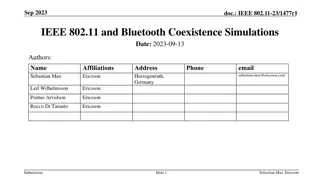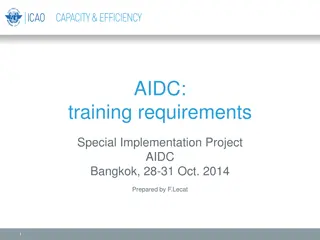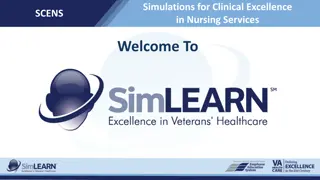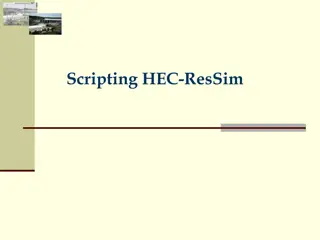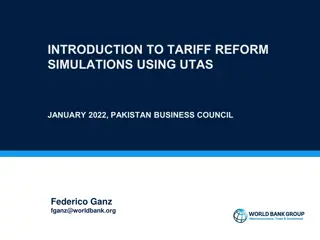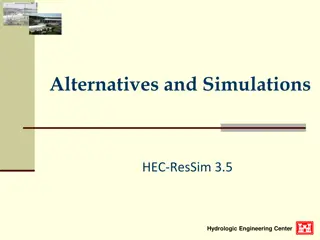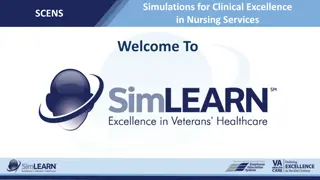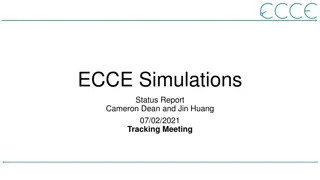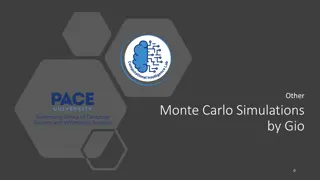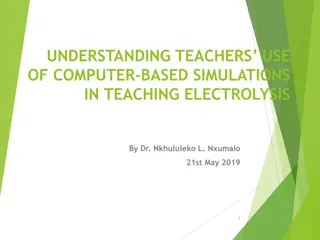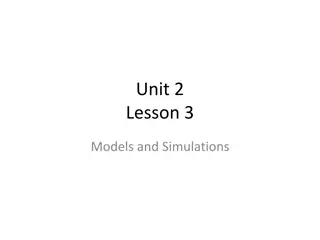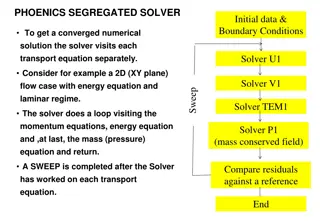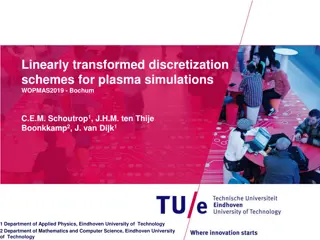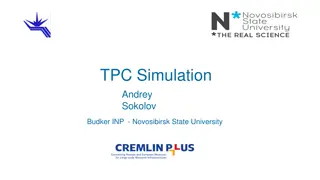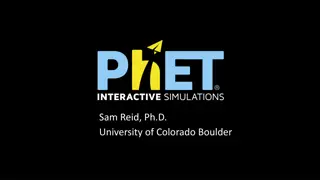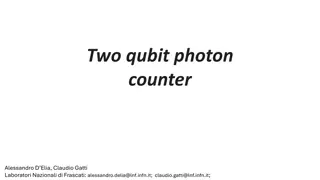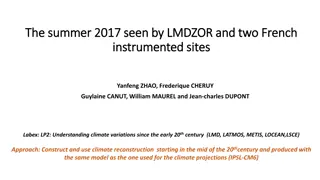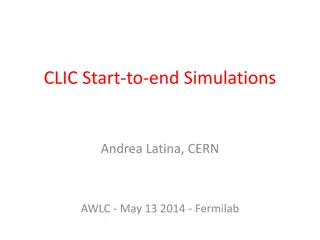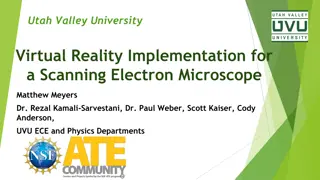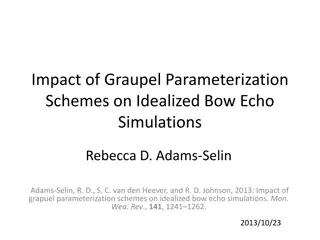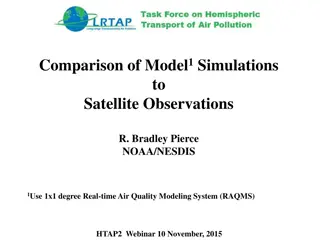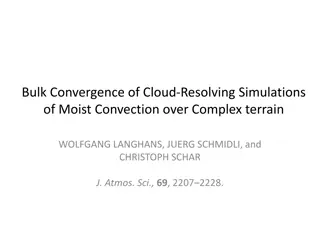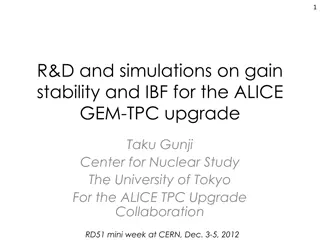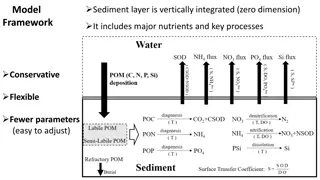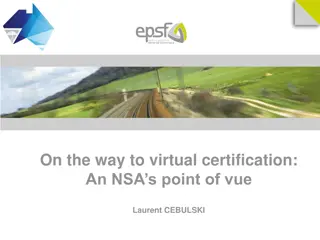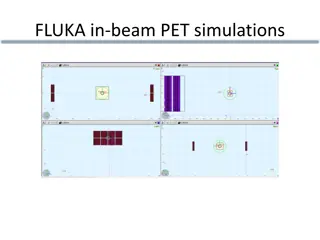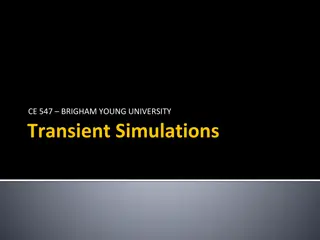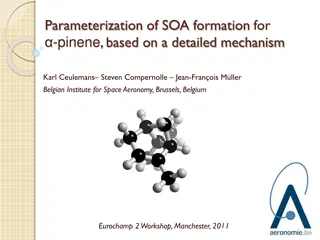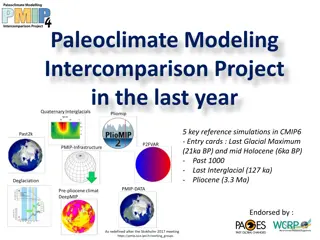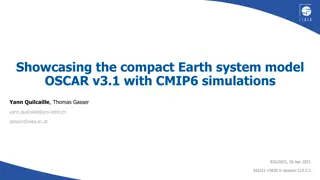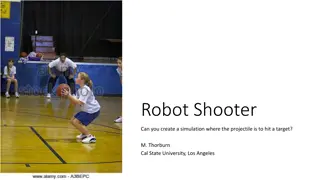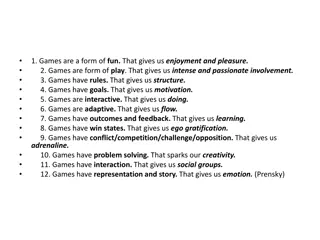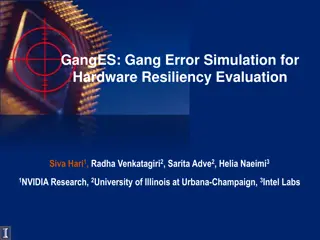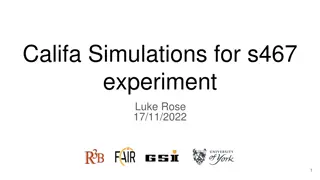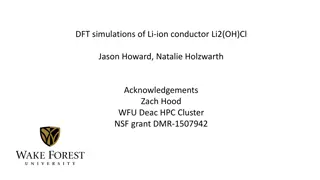Evaluation of CORDEX Experiment in South Asia using RegCM5
This study analyzes the CORDEX Evaluation Experiment in South Asia through dynamical downscaling using RegCM5 based on ERA5 data. It highlights the need for more RCM simulations in the region, showcases the use of ICTP.RegCM5, describes the dynamics and physics options in the evaluation simulation,
0 views • 8 slides
IEEE 802.11 and Bluetooth Coexistence Simulations: Assumptions and Models
This document presents simulations on the coexistence of IEEE 802.11 (Wi-Fi) and Bluetooth technologies in the 5.945GHz to 6.425GHz spectrum. It explores various assumptions and models, including spectrum usage, channelization, scenario setups for Bluetooth and Wi-Fi links, and the capabilities of b
6 views • 54 slides
Understanding Different Types of Scripts in HEC-ResSim
Explore the two main categories of scripts in HEC-ResSim - scripts executed outside simulations and scripts executed during simulations. Learn about the functions and properties of each type, including scripted rules and state variable scripts. Discover how these scripts compute flow limits, store m
6 views • 23 slides
Training Requirements and Implementation Project Overview
This document outlines the training requirements and implementation steps for the Special Implementation Project in AIDC Bangkok. It covers general steps for developing simulations and procedures, specific training needs for ATCOs, FDOs, ATSEPs, and other staff, as well as understanding system roles
0 views • 8 slides
Clinical Excellence in Nursing: SCENS Simulations for Disruptive Behavior Management
SCENS provides simulations focusing on Prevention and Management of Disruptive Behavior (PMDB) in nursing services, emphasizing safety protocols and effective communication. The training covers early signs of escalating behavior, stress levels recognition, and interventions to handle disruptive situ
0 views • 19 slides
Understanding Scripting in HEC-ResSim
Explore the two categories of scripts in HEC-ResSim - executed outside simulations and during simulations. Learn about static scripts for pre-processing, running simulations, and post-processing, along with the tools like Script Selector and Script Editor for script execution and editing.
0 views • 34 slides
Understanding Tariff Reform Simulations Using UTAS
This presentation introduces tariff reform simulations using UTAS in the context of the car economy example. It covers how tariffs on imported goods impact production costs and effective protection of domestic industries. Key concepts such as output tariff, upstream tariff, and effective protection
0 views • 15 slides
HEC-ResSim Alternatives and Simulations Overview
Explore the functionalities of HEC-ResSim including creating, composing, and setting up alternatives for hydrological engineering simulations. Learn about ResSim alternatives, simulation modules, and the alternative editor in detail.
0 views • 31 slides
Enhancing Nursing Services with SCENS Simulations for Clinical Excellence
SCENS (Simulations for Clinical Excellence in Nursing Services) offers a comprehensive training program focusing on initiating and monitoring Heparin infusion therapy while emphasizing effective communication. It aims to improve patient safety and quality of care by following evidence-based practice
0 views • 16 slides
ECCE Simulations Status Report and Production Overview
Production has commenced for ECCE simulations with 4 initial samples being evaluated. Detector response and output information are being checked. The production setup corresponds to June 23rd, 2021, with output locations specified. Evaluators are split into macros and are of interest to the tracking
0 views • 6 slides
Exploring Monte Carlo Simulations and Probabilistic Techniques
Dive into the world of Monte Carlo simulations and probabilistic methods, understanding the basic principles, the Law of Large Numbers, Pseudo-Random Number Generators, and practical Monte Carlo steps. Explore topics like conditional probability, basic geometry, and calculus through engaging exercis
3 views • 10 slides
Wildland Fire Emergency Preparedness at Kidder Creek Camp
Detailed preparation, consultation with Cal Fire, fire simulations, and robust planning efforts have been undertaken to ensure the safety and evacuation readiness of Kidder Creek Camp in the event of a wildland fire emergency. Various resources and consultations have been utilized, and simulations r
0 views • 34 slides
Enhancing Learner Understanding through Computer-Based Simulations in Teaching Electrolysis
Computer-based simulations (CBS) have the potential to improve learner comprehension of complex science concepts like electrolysis. Challenges in teaching and learning electrolysis include identifying anode/cathode, analyzing reactions, and writing chemical equations. Factors contributing to these c
0 views • 34 slides
Understanding Models and Simulations in Education
Explore the concept of models and simulations in education through a series of true or false statements, captions for photos, and a discussion on the representation of complex systems such as the human body. Delve into the roots of English words and their connections to Latin, gaining insights into
0 views • 54 slides
Efficient Solver Techniques in CFD Simulations
This resource provides insights into the segregated solver approach in computational fluid dynamics (CFD) simulations, specifically focusing on the sweeping direction and its impact on computational efficiency and convergence rates. It discusses the benefits of employing the XY plane for 2D cases to
1 views • 50 slides
Correlated Head-Tail Instability in Beam-Beam Collisions
The study discusses the impact of the cross wake force and correlated head-tail instability in collisions with a large crossing angle. It delves into the mechanism of beam-beam instability, cross wake force induction, mode coupling, and particle tracking simulations. Design parameters and instabilit
0 views • 34 slides
Linearly Transformed Discretization Schemes for Plasma Simulations
Addressing the computational challenge of CO2 decomposition with plasmas, this study focuses on developing advanced discretization schemes and modern iterative linear solvers to ensure physical invariants are respected. The research explores the use of chemical invariants to simplify complex systems
0 views • 22 slides
Cutting-Edge TPC Simulation Techniques at Budker INP & NSU
Cutting-edge TPC simulation techniques implemented by researchers at Budker INP and NSU include framework implementations, event displays, background simulations, track distortions, and gas medium simulations. Researchers like Andrey Sokolov, Lev Shekhtman, Vijayanand KV, and Timofey Maltsev have co
0 views • 15 slides
Interactive Science Simulations by PhET - Engaging Learning Experiences
Explore PhET Interactive Simulations founded by Nobel Prize physicist Carl Wieman, offering over 120 interactive simulations across various scientific disciplines. From Energy Skate Park to Molecule Shapes, these simulations provide engaging, game-like experiences for students and scientists alike.
0 views • 13 slides
Quantum Circuit Simulations and Electromagnetic Analyses in Quantum Photonics
Explore the world of quantum photonics with insights into two-qubit photon counters, jointed cavities, qubit pads, and quantum circuit simulations. Ansys simulations and experimental data by researchers Alessandro D'Elia and Claudio Gatti provide in-depth analysis of quantum phenomena. Discover the
0 views • 7 slides
Insights into Summer 2017 Climate Variations and Heatwave Events
Climate research using climate reconstructions and model simulations for summer 2017, focusing on heatwave periods and temperature anomalies. Observations from instrumented sites and atmospheric soundings were utilized to analyze air temperature, soil moisture, and radiation. The study highlights th
0 views • 22 slides
CLIC Start-to-End Simulations Overview
Review of CLIC start-to-end simulations including main simulation codes, past results, and upcoming work. Focus on realistic performance assessments, tolerance evaluations, emittance transport, mitigation techniques, operational scenarios, luminosity studies, and tools used. Detailed information pro
0 views • 12 slides
Utah Valley University - Virtual Reality Implementation for Nanotechnology Education
Utah Valley University (UVU) introduces a nanotechnology course this fall, leveraging VR simulations to train students in nanofabrication and characterization techniques such as photolithography, electron beam lithography (EBL), sputtering, and microscopy. The VR simulations help students familiariz
0 views • 8 slides
Impact of Graupel Parameterization Schemes on Bow Echo Simulations
The study explores the impact of graupel parameterization schemes on idealized bow echo simulations, focusing on the role of the cold pool in shaping storm structure and longevity. Changes in microphysical characteristics, cold pool strength, and vorticity balance are examined using a cloud-resolvin
0 views • 23 slides
Comparison of Model 1 Simulations to Satellite Observations for July 1, 2010
Explore the comparison of Model 1 simulations with various satellite measurements such as AIRS, OMI, CloudSat, and CALIPSO for July 1, 2010. Focus on OMI Tropospheric NO2 data and factors impacting the tropospheric NO2 column retrieval.
0 views • 27 slides
Analysis of Cloud-Resolving Simulations Over Complex Terrain
Examining cloud-resolving simulations of moist convection over complex terrain using large eddy simulation (LES) and deep convective fluxes. The study includes characteristics of the simulations, numerical convergence, and turbulent diffusion. Results reveal insights into the behavior of convective
0 views • 20 slides
R&D and Simulations on Gain Stability and IBF for ALICE GEM-TPC Upgrade
The research and development efforts, along with simulations, focus on enhancing gain stability and addressing issues related to Ion Back Flow (IBF) for the ALICE GEM-TPC upgrade. Detailed outline, status updates, and major challenges are discussed, highlighting the significance of the upgrade for i
0 views • 24 slides
Integrated Sediment Model for Nutrient Processes in Chesapeake Bay
This sediment model framework integrates major nutrients and key processes in a vertically integrated, zero-dimensional scheme. It is characterized by its conservative and flexible nature, with fewer parameters making adjustments easy. The model includes a scheme for POM remineralization and finds a
0 views • 8 slides
The Evolution of Virtual Certification in NSA Perspective
The journey towards virtual certification, as seen through the lens of an NSA, involves navigating expensive, time-limited, and location-limited processes. The classic process involves safety demonstrations, risk analysis, and virtual simulations, highlighting the advantages and drawbacks of testing
0 views • 11 slides
Advanced Imaging Simulations for Hadrontherapy and PET Procedures
Explore advanced FLUKA in-beam PET simulations and Hadrontherapy activity-based generator for precise treatment planning. Speed up simulations using cloud computing and bias activity-based generators for faster workstation processing. Understand components needed for hadrons treatment simulation, in
0 views • 11 slides
Understanding Transient Simulations in MODFLOW
Explore the key aspects of transient simulations in MODFLOW such as storage coefficients, initial conditions, stress periods, and the Changing Head Boundary package. Learn about the importance of storage parameters, LPF package options, defining initial conditions, and utilizing model-generated head
0 views • 16 slides
Understanding SOA Formation for α-Pinene Using Detailed Mechanisms
This content discusses the parameterization of secondary organic aerosol (SOA) formation for α-pinene based on a detailed mechanism, outlining the BOREAM model for simulations, incorporating explicit and generic chemistry. Various experiments and simulations in smog chambers are analyzed, revealing
0 views • 21 slides
Insights from Paleoclimate Modeling Intercomparison Project in CMIP6
The Paleoclimate Modeling Intercomparison Project (PMIP) in CMIP6 focuses on key reference simulations such as the Last Glacial Maximum, mid-Holocene, Past 1000 years, Last Interglacial, and Pliocene. A recent conference highlighted new aspects, promising developments, and the need for stronger coll
0 views • 4 slides
Comprehensive Overview of OSCAR v3.1: A Compact Earth System Model with CMIP6 Simulations
Showcasing the compact Earth system model OSCAR v3.1 and its CMIP6 simulations. OSCAR is a reduced-form Earth system model calibrated to emulate complex models, focusing on radiative forcing, temperatures, precipitation, ocean heat content, aerosols, ozone, and more. Historical periods and scenarios
0 views • 15 slides
Projectile Target Simulation with MATLAB
Explore three challenging problems involving projectile simulations with MATLAB. Step-by-step solutions are provided to create simulations, determine optimal parameters, utilize animated lines for trajectory visualization, and incorporate drag force equations. Enhance your MATLAB skills in projectil
0 views • 4 slides
Insights into Games, Simulations, and Learning Environments
Discover the multifaceted aspects of games, simulations, and learning through a comprehensive exploration of their characteristics, purposes, and applications. From the elements that make games engaging to the utility of simulations in replicating real-world scenarios, this content delves into the d
0 views • 79 slides
GangES: Gang Error Simulation for Hardware Resiliency Evaluation
GangES introduces a new error simulator to expedite full error simulations for assessing hardware resiliency. By reducing the number of simulations and leveraging program structure, it achieves significant time savings over existing methods. Additionally, the study explores the feasibility of progra
0 views • 38 slides
Califa Simulations and Experimental Observations in Nuclear Physics Research
Exploring nuclear physics research through Califa simulations and experimental observations with a focus on PID gating, clustering algorithms, beam settings, and Ca isotopes chain gating. The study involves simulating events on CH2 targets, analyzing clustering effects, and observing opening angles
0 views • 10 slides
Understanding Lithium Ion Conduction in Li2(OH)Cl Through DFT Simulations
DFT simulations were conducted on the lithium ion conductor Li2(OH)Cl to investigate its low and high-temperature phases. The motivation behind the study was to uncover the structural features impacting the phase transition and diffusion properties of the material. The background highlighted two pha
0 views • 16 slides
Understanding Sample Size Parameters in Pet Product Studies
This set of additional slides delves into the main parameters used in simulations for determining sample sizes in pet product studies. It covers the methods of simulations, statistical support, new simulations, resulting sample sizes, variations between animals and days, and the rationale behind spe
0 views • 11 slides

